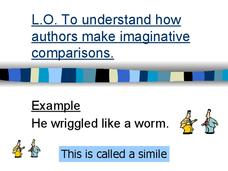Curated OER
Language Arts- Parts of Speech: Sorting Nouns and Verbs
In this grammar activity, students cut out the word cards and glue them under the noun heading if they are nouns, and the verb heading if they are verbs. There are 20 words to sort through.
Curated OER
Parts of speech and "grammar rock": English
Sixth graders use the video of "Grammar Rock", class discussion, worksheets and group work to explore grammar and parts of speech. They produce a film strip displaying their understanding of parts of speech in English.
EngageNY
Mid-Unit 3 Assessment, Part I: Short Constructed Response and Organizing Notes for a Public Speech
It's time to put pen to paper. Scholars complete the first part of the mid-unit 3 assessment, writing a short constructed response about international aid following a natural disaster. Next, pupils use informational texts and note...
Curated OER
Summarizing Political Cartoons by Using Standard Parts of Speech
Students analyze a political cartoon, and at the same time cover the basic parts of speech, in order to view a cartoon and determine its subject, action verb, and object.
Curated OER
Parts of Speech: Noun
Students define different types of nouns, including proper nouns, pronouns, singular and plural nouns; students identify nouns in a sentence.
Curated OER
Parts of Speech: Nouns
In this crossword puzzle worksheet, students complete the crossword puzzle using the nouns from the word bank and the clues. Students learn 16 nouns.
Curated OER
Parts of Speech: Verbs
In this verbs worksheet, students review the definition of a verb. Students draw a line from draw a line from each pencil to a verb in the sentence. Students place the first letter for the verbs in the numbered box and then find the...
Curated OER
Parts of Speech: Adjectives
For this adjectives worksheet, students review the definition for an adjective and then circle the adjectives they could use to describe the 10 pictures.
Curated OER
Parts of Speech: Verbs
In this verbs learning exercise, students review the definition of a verb and then read the verb at the beginning of each row. Students choose all the nouns in that row that could complete the action verb. Students color in the pencil to...
Curated OER
Parts of Speech: Adjectives
In this adjectives worksheet, students review the definition of adjectives and use the adjective word bank to help them complete the 8 sentences.
Curated OER
Parts of Speech: Adjectives
In this adjectives worksheet, students review the definition for an adjective and then draw a line from each pencil to an adjective in the 9 sentences.
Curated OER
Meet Your Neighbor: Action Verbs
Get your kids moving on the first day of school! This action verb activity doesn't have to be used as an ice breaker, but it sure will work as one. Simply place pairs of cards face-side down on the carpet, each with an action verb...
Jen London
Julius Caesar Funeral Speech Essay Assignment
"Romans, countrymen, and lovers! Hear me for my cause." "Friends, Romans, countrymen, lend me your ears!" As part of a study of William Shakespeare's Julius Caesar, individuals as asked to compare the funeral speeches of Brutus and Mark...
Curated OER
Synonyms - How Authors Make Comparisons
A very good 13-slide presentation on similes and metaphors is here for you. It introduces young poets to each term, gives examples, and prompts them to work together to identify similes and metaphors in several different sentences.
Curated OER
Auxiliary Verbs
Auxiliary verbs are the focus of this language arts presentation. These types of verbs are very specific, and are taught quite effectively during the PowerPoint. Pupils are invited to do their own pieces of writing that use auxiliary...
Curated OER
What's wrong with "could of," "should of," "would of?"
A common mistake in writing is using the words, "could of" instead of "could have." Additionally, many young writers make the mistake of following a contraction with the word "of." For example; He wouldn't of waited for you. This...
Curated OER
Synonyms
Similes and Synonyms are the focus of this language arts presentation. After being introduced to similes and how they work, young writers practice writing similes about the sun by using phrases such as, "The sun is like a golden ring...
K12 Reader
Adjectives Add Interest
A world without adjectives would be a sad place indeed! Make sure adjectives stay around by teaching your class about what they are and how using them can make a boring story truly interesting. Learners put this idea into practice by...
K12 Reader
Comparative Adverbs
Show the comparative forms of adverbs with a straightforward learning exercise. Learners decide how to represent 16 adverbs in both comparative and superlative forms.
Vocabulary A-Z
5-Day Vocabulary Teaching Plan
Reinforce important reading skills with a set of vocabulary lesson plans. Middle schoolers complete sentences, play word games, finish analogies, and build their growing vocabulary with a packet of helpful and applicable graphic organizers.
K12 Reader
Adjectives Describe
Vivid writers all start out the same way: learning in elementary school how to use a variety of adjectives! Young grammarians add adjectives to eight fill-in-the-blank sentences.
K12 Reader
Adjectives: Add the Noun
Learning how to use adjectives isn't just about adding describing words! Pupils select original nouns to add to ten adjectives in a straightforward grammar worksheet.
K12 Reader
Adjectives: Which Noun Does It Describe?
Adjectives can come before or after the noun they describe. Eight simple sentences prompt learners to circle the noun that each underlined adjective is describing.
K12 Reader
Change the Adjectives to Nouns
Adjectives are supposed to describe nouns, but they can actually become nouns themselves! Learners review ten adjectives and transform them into the nouns found in their roots.

























